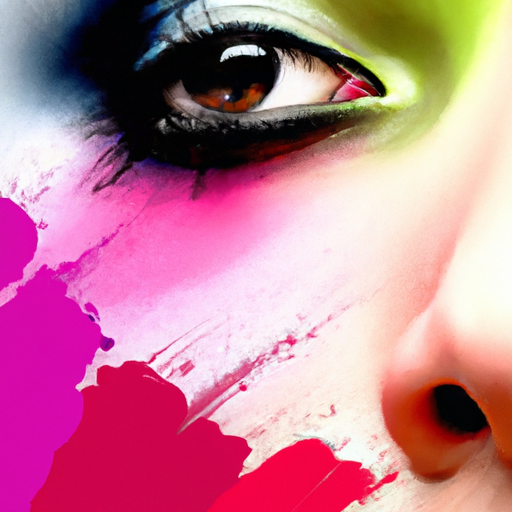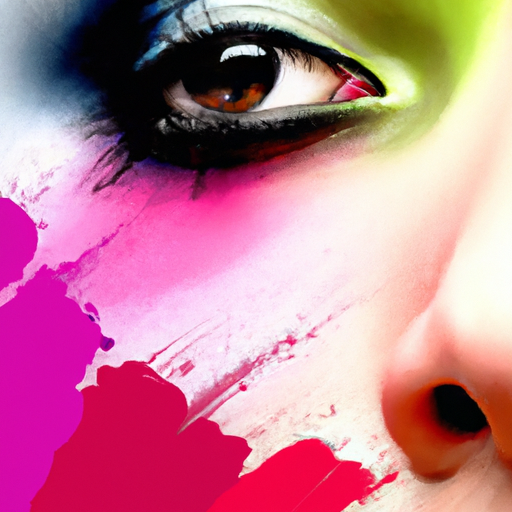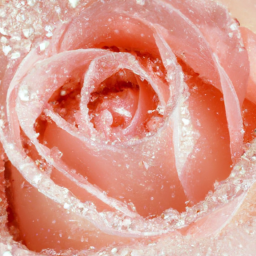Trends In Beauty Industry
In the ever-evolving world of beauty, there is always something new on the horizon. From groundbreaking skincare innovations to unique makeup techniques, the beauty industry is constantly evolving. This article explores the latest trends in the beauty industry, providing a glimpse into the exciting and transformative world of beauty. Whether you’re a beauty enthusiast or simply curious about the latest trends, this article is your guide to staying ahead of the game and embracing the ever-changing world of beauty.

Table of Contents
Technology in Beauty
AI in beauty products
Artificial intelligence (AI) has revolutionized the beauty industry, bringing next-level innovation and efficiency to various products. AI-powered beauty devices use advanced algorithms to analyze your skin, hair, and specific concerns. This technology allows for personalized recommendations and solutions tailored to your unique needs. From AI-driven skincare analysis apps to virtual makeup try-on tools, AI is enhancing the way we interact with beauty products and helping us make more informed choices.
Virtual try-on
Virtual try-on technology has transformed the way we shop for beauty products. Instead of physically trying on multiple shades or products, virtual try-on allows you to virtually see how different makeup looks on your face. This technology uses augmented reality (AR) to superimpose virtual products onto your live camera view, giving you a realistic preview of how the products will look on your skin. It saves time and provides a fun and interactive way to experiment with different looks before making a purchase.
Smart skincare devices
Smart skincare devices have become increasingly popular in recent years. These high-tech gadgets use advanced technology to improve your skincare routine and treatment efficacy. From cleansing brushes with oscillating bristles to devices that deliver deep facial massages, smart skincare devices enhance product absorption, stimulate collagen production, and increase blood circulation. They offer a spa-like experience in the comfort of your own home, helping you achieve healthier and more radiant skin.
Beauty tech startups
The beauty industry is witnessing a surge of innovative beauty tech startups. These startups harness the power of technology to address various beauty concerns and offer unique solutions. Whether it’s developing AI-driven skincare analysis apps, creating innovative devices for personalized beauty treatments, or launching virtual beauty platforms, these startups are pushing the boundaries of beauty technology. They bring fresh ideas and disruptive approaches to the market, fueling the industry’s growth and consumer interest in tech-infused beauty products.
Clean Beauty
Demand for natural and organic products
The demand for natural and organic beauty products has skyrocketed in recent years as consumers become more aware of potential harmful ingredients in traditional beauty products. Clean beauty focuses on using naturally derived and non-toxic ingredients, avoiding ingredients like parabens, sulfates, and synthetic fragrances. Consumers are increasingly prioritizing products with transparent ingredient lists and opting for brands that align with their values of sustainability, health, and environmental consciousness.
Transparency and sustainability
Transparency and sustainability are key factors driving the clean beauty movement. Consumers expect brands to provide transparency regarding their sourcing, manufacturing processes, and the environmental impact of their products. Clean beauty brands prioritize sustainable practices, use recyclable and eco-friendly packaging, and often support ethical sourcing and fair trade. By promoting transparency and sustainability, these brands actively cater to conscious consumers who value both the quality of their products and the environmental impact they make.
Clean beauty certifications
To help consumers navigate the clean beauty landscape, various certifications and labels have emerged. These certifications provide assurance that a product meets specific clean beauty criteria, ensuring it is free from harmful ingredients and produced with ethical and sustainable practices. Examples of clean beauty certifications include USDA Organic, EWG Verified, and Leaping Bunny (cruelty-free). By seeking products with these certifications, consumers can confidently choose clean beauty products that align with their values and prioritize their health and well-being.
Personalized Beauty
Customized skincare and makeup
Personalized beauty takes customization to a whole new level. Advancements in technology and data analysis have allowed brands to offer personalized skincare and makeup products tailored to individual needs and preferences. Through skin analysis tools, product recommendations, and custom blend options, consumers can create skincare and makeup regimens that are uniquely suited to their skin type, concerns, and desired results. Personalized beauty allows for a more targeted and effective approach to achieving desired beauty outcomes.
Beauty DNA testing
Beauty DNA testing has gained popularity as a means to uncover genetic factors that influence one’s skin traits and aging process. By analyzing your DNA, these tests provide insights into your skin’s genetic predisposition, allowing for personalized skincare recommendations and targeted treatment plans. Beauty DNA testing helps identify specific skincare concerns and helps you better understand how your skin may age over time. Armed with this knowledge, you can make more informed decisions when selecting skincare products and treatments.
Personalized recommendations
In addition to DNA testing, personalized beauty also leverages data analysis and AI algorithms to provide tailored recommendations. By analyzing skincare concerns, preferences, and previous product usage, brands can suggest specific products that address individual needs. This personalized approach ensures that consumers receive targeted recommendations based on their unique skin conditions, lifestyle, and personal preferences. It enhances the overall effectiveness of the products and improves the consumer experience.
Bespoke beauty products
Bespoke beauty takes personalization to another level by offering fully customized and tailor-made beauty products. From personalized foundation shades to bespoke fragrances, brands are embracing the concept of creating products that cater to individual preferences. Through virtual consultations, 3D-printing technology, or in-person interaction, consumers can select ingredients, textures, and desired performance factors to create their own unique beauty formulations. Bespoke beauty allows for truly one-of-a-kind products that align perfectly with an individual’s needs and desires.
Inclusive Beauty
Diversity in advertising and campaigns
Inclusive beauty focuses on representing and celebrating diverse beauty standards. Beauty brands are embracing a wider range of ethnicities, body types, ages, and gender expressions in their advertising and campaigns. By featuring models and spokespeople from diverse backgrounds, they aim to break traditional beauty norms and foster greater inclusivity and representation in the industry. Inclusive advertising sends a powerful message that beauty comes in all forms and encourages consumers to embrace their unique beauty.
Expanding shade ranges
One of the most significant achievements in inclusive beauty has been the expansion of shade ranges in makeup products. Historically, many brands offered limited options that did not cater to a wide array of skin tones. However, the push for inclusivity has led to the development of more diversified shade ranges, ensuring that individuals with deeper and lighter skin tones can find products that match their complexion. This shift has empowered consumers and promoted a greater acceptance and celebration of diverse beauty.
Gender-neutral beauty
Gender-neutral beauty challenges traditional gender norms and aims to provide beauty products and experiences that are inclusive for all genders. Brands are launching gender-neutral skincare and makeup lines, breaking away from the notion that beauty is defined by gender. This inclusive approach creates a more inclusive and accepting beauty landscape, where individuals can freely express themselves without conforming to societal expectations.
Accessibility in beauty
Accessibility in beauty focuses on making beauty products and experiences accessible to individuals with disabilities. Brands are prioritizing inclusive packaging designs, incorporating Braille labels, and ensuring that their products are user-friendly for individuals with physical limitations. The goal is to ensure that everyone, regardless of ability, can enjoy and benefit from beauty products and self-care experiences. By embracing accessibility, brands promote inclusivity and create a more equitable beauty industry.
Self-care Skincare
Rise of skincare routines
self-care skincare has become a significant trend, with a focus on building dedicated skincare routines. Instead of relying on sporadic product usage, individuals are adopting multi-step skincare regimens to address various concerns and achieve long-term results. Skincare routines typically involve cleansing, exfoliating, toning, hydrating, and protecting the skin. This increased emphasis on skincare routines encourages individuals to prioritize self-care and invest in their skin health.
Hydration and moisturization
Hydration and moisturization have taken center stage in self-care skincare. Brands are focusing on creating products that deeply nourish and hydrate the skin, resulting in a healthy and glowing complexion. Hyaluronic acid-infused products, moisturizers enriched with natural oils, and hydrating face masks have become popular choices. With increased awareness of the importance of skin hydration, individuals are incorporating these products into their routines as a way to care for and pamper their skin.
Focus on mental well-being
Self-care skincare goes beyond physical beauty and places emphasis on mental well-being. The act of taking care of your skin can be a soothing and therapeutic experience, promoting relaxation and stress relief. Skincare routines can serve as a form of mindfulness, allowing individuals to practice self-love and self-care. Brands are recognizing this connection between skincare and mental well-being, incorporating calming scents, promoting self-care rituals, and emphasizing the importance of self-acceptance in their messaging.
At-home spa experiences
With the rise of self-care skincare, at-home spa experiences have become increasingly popular. Brands are launching products and treatments that mimic the luxurious feel of a spa within the comfort of one’s own home. From facial steamers and massage tools to sheet masks and bath bombs, individuals can recreate the spa experience and indulge in self-care rituals at their convenience. At-home spa experiences provide a sense of relaxation and rejuvenation, promoting overall well-being and a moment of self-indulgence.
Sustainable Packaging
Reducing plastic waste
Sustainable packaging addresses the issue of excessive plastic waste generated by the beauty industry. Brands are adopting various strategies to reduce their plastic footprint, such as opting for recyclable, biodegradable, or compostable packaging materials. Additionally, some brands are introducing innovative packaging designs that minimize plastic usage, such as refillable and reusable containers. By actively exploring alternatives to traditional plastic packaging, the beauty industry is taking steps towards a more sustainable future.
Eco-friendly packaging materials
Eco-friendly packaging materials, such as glass, bamboo, and paper-based materials, are gaining popularity in the beauty industry. These materials have a lower environmental impact, as they are often recyclable, biodegradable, or easily renewable. By opting for eco-friendly packaging materials, brands can reduce their carbon footprint and contribute to a more sustainable beauty landscape. Consumers are increasingly seeking products with eco-friendly packaging, reflecting their concern for the environment and their desire for sustainable choices.
Refillable and reusable containers
Refillable and reusable containers have emerged as an innovative solution to reduce packaging waste. Some brands are introducing refill stations in their stores, allowing customers to refill their empty product containers instead of purchasing new ones. Other brands offer refill packs or cartridges, which can be used to replenish the products in the original packaging. By embracing refillable and reusable containers, brands encourage consumers to adopt more sustainable habits and reduce single-use plastic waste.
Upcycling and recycling initiatives
Upcycling and recycling initiatives further promote sustainability in beauty packaging. Brands are encouraging consumers to participate in recycling programs by providing designated collection points for empty containers. Some brands collaborate with recycling organizations to ensure proper recycling and disposal of their products. Additionally, brands are upcycling materials, repurposing packaging waste into new products or incorporating recycled materials into their packaging designs. These initiatives help reduce waste and promote a circular economy within the beauty industry.
CBD in Beauty
Emergence of CBD-infused products
CBD-infused beauty products have gained significant popularity in recent years. CBD (cannabidiol) is derived from the cannabis plant and is known for its potential therapeutic benefits. It has antioxidant and anti-inflammatory properties, making it a desirable ingredient for skincare and wellness products. CBD-infused products range from serums, creams, and masks to lip balms, bath salts, and even haircare products. The emergence of CBD-infused products has opened up new possibilities for incorporating natural, plant-based ingredients into our beauty routines.
Benefits of CBD for skincare
CBD offers several potential benefits for skincare. Its anti-inflammatory properties can help soothe irritation, redness, and inflammation, making it suitable for sensitive and acne-prone skin. CBD’s antioxidant properties also help protect the skin from environmental stressors and free radicals, contributing to a youthful and radiant complexion. Additionally, CBD has shown potential in regulating oil production, reducing the appearance of fine lines and wrinkles, and promoting overall skin health. These benefits make CBD a sought-after ingredient in skincare products.
Legal considerations and regulations
While CBD-infused beauty products have gained popularity, legal considerations and regulations vary by country and region. It’s important for brands and consumers to understand the legal landscape and ensure compliance with local laws. Regulations may dictate the concentration of CBD allowed in products, labeling requirements, and the legal status of CBD itself. A thorough understanding of the legal considerations is essential to ensure the safe and legal use of CBD in beauty products.
Wellness Beauty
Beauty from within
Wellness beauty focuses on holistic approaches to beauty that emphasize overall well-being, including physical, mental, and emotional health. This approach recognizes that true beauty radiates from within and is not solely dependent on external skincare and makeup products. Brands are launching beauty supplements, nutricosmetics, and ingestible products that aim to support skin health, hair growth, and overall vitality. By addressing beauty from within, wellness beauty encourages individuals to embrace a comprehensive approach to self-care and beauty.
Nutricosmetics and supplements
Nutricosmetics and beauty supplements have gained popularity as individuals seek to enhance their beauty from the inside out. These products often contain vitamins, minerals, antioxidants, and other ingredients that promote skin health, hair growth, and overall wellness. From collagen supplements for youthful skin to biotin-infused gummies for stronger hair, beauty supplements offer a convenient and effective way to complement external skincare and promote beauty from within.
Holistic approaches to beauty
Holistic approaches to beauty embrace the interconnectedness of the mind, body, and spirit. They recognize that beauty is not solely about external appearances but also encompasses mental well-being, emotional balance, and overall health. Brands are incorporating mindfulness practices, stress-relief techniques, and self-care rituals into their beauty offerings. By fostering holistic approaches to beauty, individuals are encouraged to prioritize self-care, nurture their emotional well-being, and cultivate a positive relationship with themselves.
Innovative Makeup
Unique texture and formula
Innovative makeup products are capturing the attention of beauty enthusiasts with their unique textures and formulas. Brands are pushing boundaries and introducing new textures, such as liquid-to-powder foundations, cushion blushes, and jelly highlighters. These innovative formulas offer a fresh and exciting experience, while also delivering high-performance results. By embracing unique textures and formulas, makeup brands provide consumers with innovative options that enhance their creativity and allow for more diverse makeup looks.
Multifunctional makeup products
Multifunctional makeup products have gained popularity as consumers seek simplicity and versatility in their beauty routines. These products offer multiple benefits and can be used for various purposes, saving time and space in your makeup bag. Examples of multifunctional products include tinted moisturizers with SPF, lip and cheek duos, and eyeshadow palettes that double as highlighters. By embracing multifunctionality, makeup brands cater to individuals who value convenience without compromising on quality and aesthetics.
Sustainable and ethical makeup brands
Sustainable and ethical makeup brands are making waves in the industry, prioritizing environmental consciousness and ethical sourcing. These brands are committed to reducing their carbon footprint, using clean ingredients, and implementing sustainable practices throughout their supply chains. They often opt for eco-friendly packaging, recyclable materials, and support fair trade and animal welfare. By choosing sustainable and ethical makeup brands, consumers can enjoy high-quality products that align with their values of environmental responsibility and social consciousness.
Social Media Influence
Impact of beauty influencers
Beauty influencers have become powerful voices in shaping beauty trends and consumer preferences. These social media personalities share their expertise, tips, and product recommendations with large and engaged audiences. From makeup tutorials and skincare routines to product reviews and beauty hacks, beauty influencers influence purchasing decisions and introduce followers to new products and brands. Their authenticity and relatability resonate with consumers, making them influential figures in the beauty industry.
User-generated content
User-generated content has become a driving force in the beauty industry. Consumers now actively participate in the creation of content by sharing their personal beauty routines, makeup looks, and product reviews on social media platforms. Brands often encourage user-generated content through contests, hashtags, and collaborations. This not only fosters a sense of community but also provides valuable insights and social proof to potential customers. User-generated content allows consumers to actively engage with beauty brands and contribute to the overall conversation surrounding beauty.
Direct-to-consumer beauty brands
Direct-to-consumer (DTC) beauty brands have disrupted the traditional retail model by selling products directly to consumers through online platforms. These brands often prioritize affordable pricing, quality products, and seamless customer experiences. By cutting out intermediaries and traditional distribution channels, DTC beauty brands can offer competitive pricing while maintaining product integrity. They leverage social media and digital marketing strategies to build brand awareness and engage with their target audience directly, fostering a more intimate and personalized relationship with consumers.
As the beauty industry continues to evolve, these trends have reshaped the way we approach beauty and self-care. Technology has allowed for personalized experiences and innovative tools, clean beauty has sparked a demand for transparency and sustainability, inclusive beauty has celebrated diversity and expanded shade ranges, self-care skincare has emphasized mental well-being, sustainable packaging has tackled plastic waste, CBD has emerged as an ingredient with potential benefits, wellness beauty has promoted holistic approaches, innovative makeup has pushed boundaries, and social media influence has changed the way we discover and interact with beauty brands. The ever-changing landscape of the beauty industry reflects a growing focus on individuality, inclusivity, well-being, and sustainability, offering endless possibilities for consumers to express themselves and care for their beauty needs.

